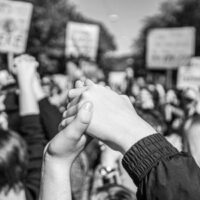Charges Protesters May Face

As the number of political demonstrations and protests across the country grows, we’ve seen a consequent rise in arrests. If you are considering participating in a protest march, it’s a good idea to do so with a clear understanding of the potential risks to your liberty.
But isn’t Peaceful Protest Legal?
Yes, throughout history, peaceful protest in the United States and elsewhere has been an important method of speaking truth to power. Political gatherings and demonstrations have been a way to underscore injustices maligning society and to call for change. Traditionally, protesting plays an essential role in helping to provide definition to social norms and legal issues, addressing matters of inequality and bias that have plagued humanity across the ages. So yes, peaceful protest is legal. But no, even though peaceful protest is a right guaranteed by the Constitution, there are times that the government’s response is beyond harsh.
Typical Arrests
Anyone who attends protests and marches risks the prospect of arrest if law enforcement feels they are participating in any of the following activities:
- Unlawful assembly: If a gathering is determined by law enforcement to be a threat to public safety due to unruliness or violence, it can be labeled an unlawful assembly. That is the case if protesters refuse to disperse when directed by police, as well.
- Obstructing justice: Evidence tampering or blocking law enforcement access to the scene could lead to arrests.
- Disorderly conduct: When crowds interrupt traffic flow, participate in vulgar chants, or otherwise disturb the peace, it could provoke arrests.
- Trespassing: When unauthorized e protestors enter government buildings or commercial offices, it is an offense that could result in arrest.
- Rioting: Even when only a handful of protesters engage in violent activity or vandalism, anyone present can be charged with rioting.
- Vandalism: Starting fires, damaging vehicles, spreading graffiti, breaking glass, and other efforts to deface or destroy property is illegal.
- Assault/battery: Anything from minor scuffles up to violent clashes between protesters, counter-protesters, or law enforcement can lead to arrests.
- Incitement/conspiracy: Egging on others to engage in criminal activities is against the law.
- Resisting arrest: Trying to get away from officers, putting up a fight, or even going limp, could lead to charges.
State or Federal Charges
The primary factor in determining whether charges are state, local or federal is based on where the offense takes place. If a demonstration occurs in a federal building or on federal property it will result in federal charges in most cases. So even if an arrestee is held in a local jail, it’s the United States Attorney who decides how the case unfolds, which means the consequences will likely be more severe. Local City or District Attorneys deal with the cases and file state or local charges when city streets, sidewalks, and parks are involved.
Defending You and Your Rights
Whether you are facing state or federal charges, the dedicated Kissimmee and Orlando criminal defense attorneys at Salazar & Kelly Law Group will fight to protect your rights and your liberty. To discuss your situation, schedule a confidential consultation office today.
Source:
amnesty.org/en/what-we-do/freedom-of-expression/protest/
